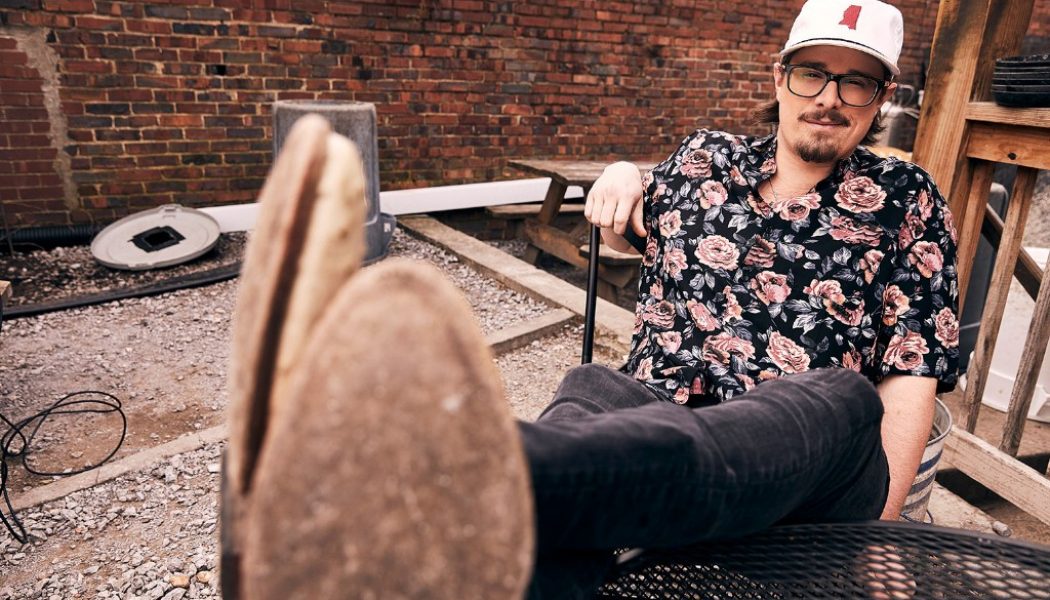
When Big Loud singer-songwriter HARDY drove back to Nashville after a visit with his dad in Philadelphia, Miss., sometime in the last two years, his father told him to hit Play on the CD in the dash at a specific point in the journey.
His father had queued up Travis Meadows‘ reflective “Mississippi,” and as the track’s storyline unfolded with every-day, familial images about “the home I couldn’t wait to leave behind,” the journey away from his hometown weighed heavily on HARDY.
“I just lost it,” he says. “I completely started crying, and I started thinking about how proud I was to be from where I was from. But I don’t know why that is.”
Maybe not, but HARDY — like many of his fellow country artists and songwriters — frequently explores the topic. He cowrote Morgan Wallen‘s current “More Than My Hometown” (No. 18, Country Airplay), a song in which the protagonist chooses his surroundings over a girlfriend who’s moving away. Alternately, HARDY’s debut album, A Rock (released Sept. 4), features “Hate Your Hometown,” in which he hopes a girlfriend will not make a similar choice.
There’s a wave of songs and albums in the genre that are built around the acts’ original residences. Luke Bryan, who hailed the peanut dust and pine trees of his native Leesburg, Ga., in the title track from his 2017 album What Makes You Country, returns to the theme in the title song from his new Born Here Live Here Die Here (released Aug. 7). Kelsea Ballerini documents those who choose to stay, and those who leave, in the kelsea album cut “Half of My Hometown.” High Valley‘s “Grew Up on That,” released to country radio via PlayMPE on Aug. 25, keys in on tractor seats and high school sports in La Crete, Alberta, the group’s remote Northern Canadian homeland.
Brett Eldredge‘s new Sunday Drive closes with “Paris, Illinois,” named after his Midwest birthplace. Dustin Lynch‘s current album bears the name of his hometown, Tullahoma, and RaeLynn‘s latest, Baytown (released Aug. 14), owes its title to her Texas roots.
“In Nashville, every artist you meet, we’re all from a little town,” reasons RaeLynn. “We’re all from somewhere special, and we all decided to move here for a big dream, and that’s what makes it so cool is you bring that little bit of your hometown to this huge city … what’s going to make us stand out in the crowd is not losing that.”
It has worked that way historically. Alabama‘s 1980 breakthrough, “My Home’s in Alabama”; Mac Davis‘ introspective 1982 midtempo “Texas in My Rear View Mirror”; and Alan Jackson‘s 1993 tongue twister “Chattahoochee” all incorporate specific images from the acts’ hometowns. And listeners don’t have to be from Fort Payne, Ala.; Lubbock, Texas; or Newnan, Ga.; to share the artists’ appreciation for their geographic origins. Hearing Randy Owen ruminate on his Southern upbringing can make a Maine native think about the lobster boats from their original home.
“It’s a lot of those first-time feelings,” says Lynch. “They never go away, you know? I can’t remember my 100th beer, but I can remember my first one, and I think that has a lot to do with it.”
But so does upheaval and the loss of innocence. Miranda Lambert‘s “The House That Built Me,” an award-winner about reconnecting with lost values, zeroes in on a single structure. But a hometown water tower, school colors or a quixotic local comfort food can take an adult back to a simpler time, too, whether they knowingly identify the meaning or just feel it subconsciously.
“I’ve been through a lot of small towns, as well as major cities,” says Lynch, “but the smaller towns, man, everybody is very proud of something. Whether that be the ball team or the barbecue joint or the diner, the brewery — whatever it may be, there’s a sense of pride in all of our hometowns.”
That may not be true, however, at every age, and the music industry, in particular, attracts people who might not have fit in where they were raised. It’s tough to make a living from music in Chockie, Okla.; Dixon, Calif.; or Altoona, Iowa; so like-minded members of the music community find their collective way to Nashville. Often, it’s several years after the migration that they come to recognize their hometown had some valuable charms, even if it failed to fulfill their creative ambition.
“Sometimes you have to run so far away from that place to realize that that place will never leave you,” notes Eldredge. “It’s not like I’m going to pick up my bags and move back to Paris, Ill., but at the same time, I’m going to go back there and I’m going to get those feelings. And I’m going to go back there in my mind.”
Or, in some instances, artists simply stamp it on their album titles. Sam Hunt‘s Montevallo, Blake Shelton‘s Texoma, Darius Rucker‘s Charleston, SC 1966 and Radney Foster‘s Del Rio, Texas 1959 all connect the acts to their hometowns or, in Shelton’s case, the regional reservoir.
That doesn’t mean that leaving is a mistake.
“My biggest advice to anybody ever, if you can, if you don’t have a family, go travel and live somewhere else,” says HARDY. “See how other people live, and it will open your mind up.”
It might also revise whatever feelings the traveler might harbor for their roots.
“Especially right now in the pandemic,” says RaeLynn, “the only thing that makes my heart feel cool and like I’m doing something right is being proud of where I’m from and having a little bit of my hometown with me.”
That’s a function served in America’s mobile culture by those songs about our geographical roots: Even when we can’t go home physically, we can make a three-minute emotional visit.
This article first appeared in the weekly Billboard Country Update newsletter. Click here to subscribe for free.










